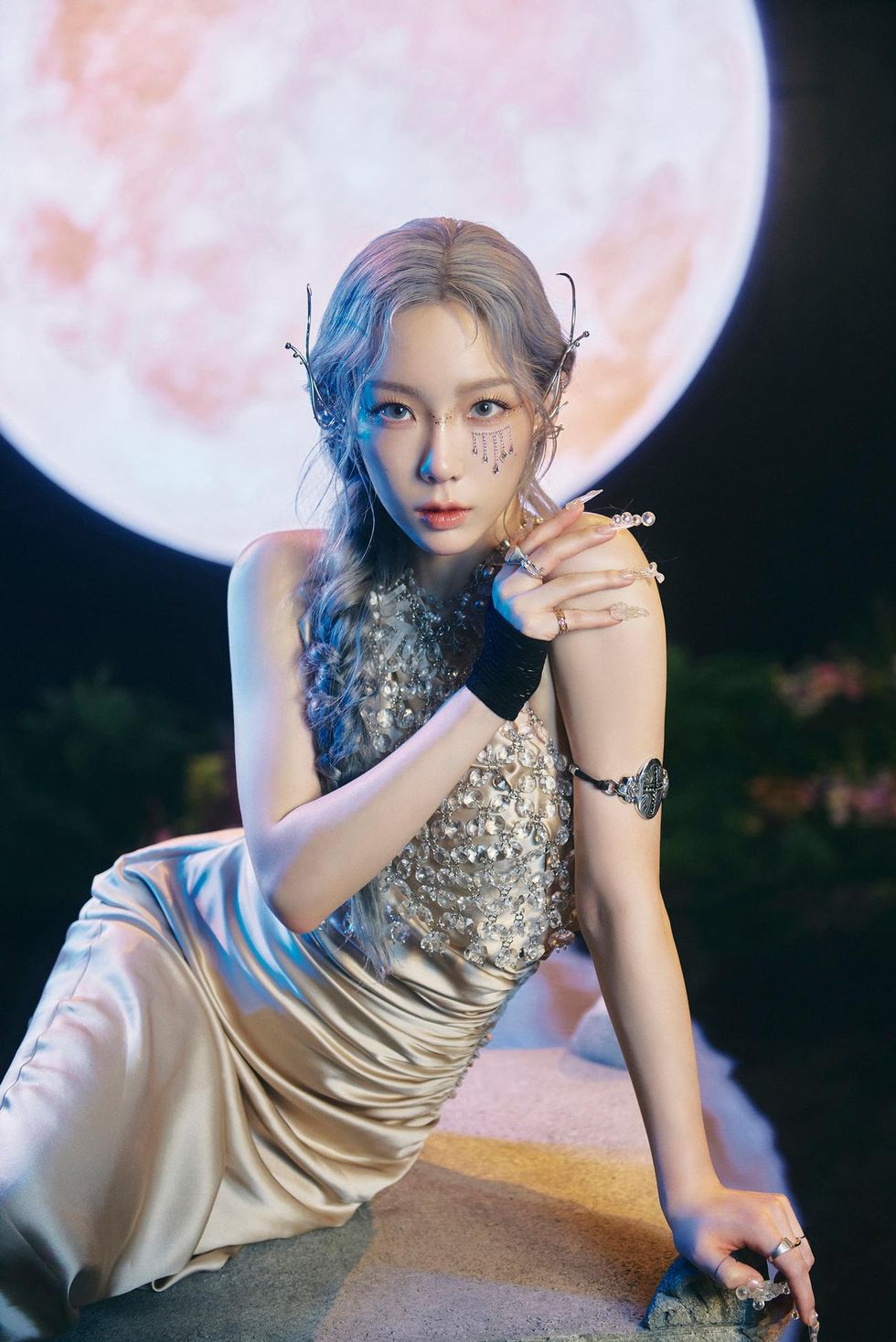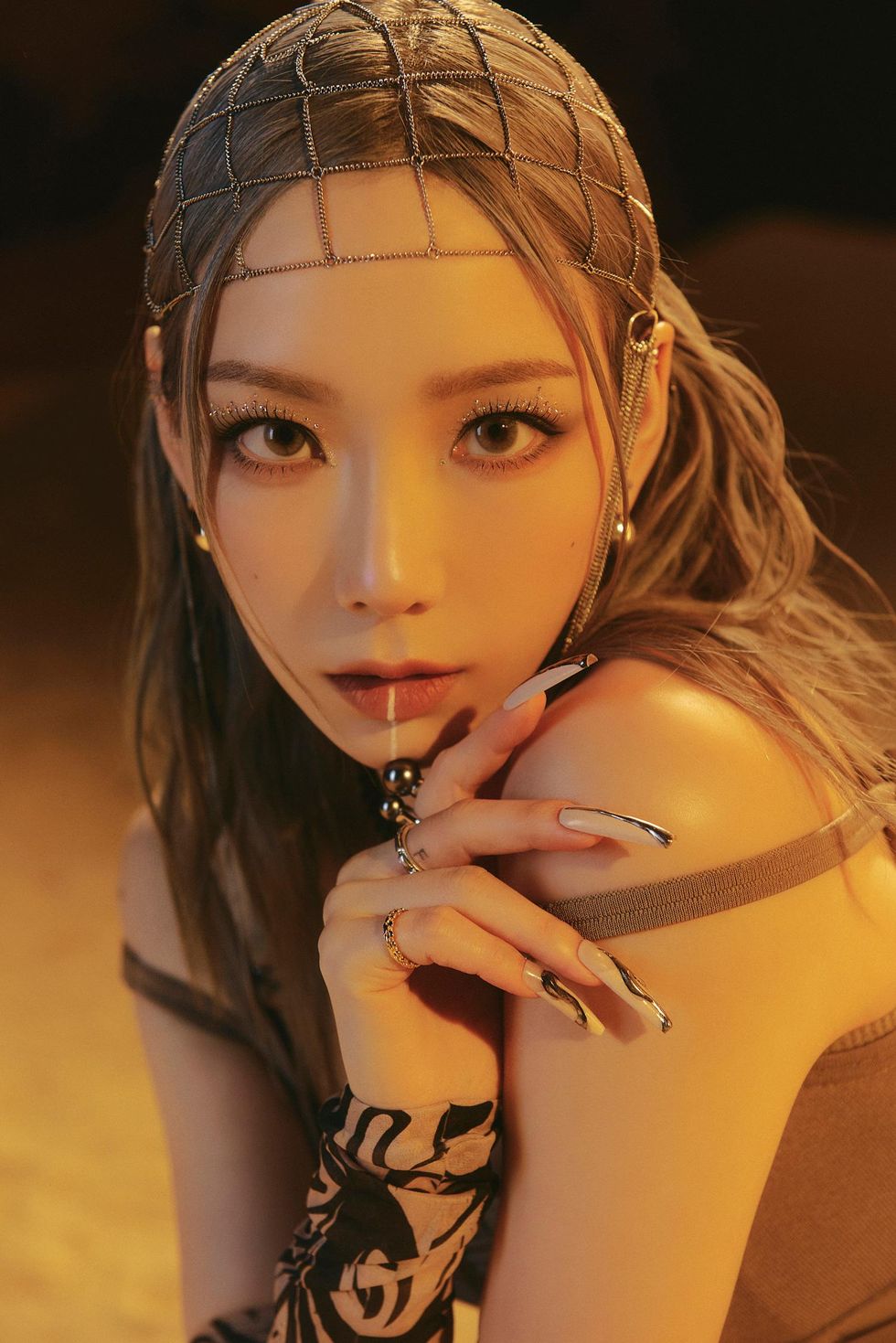
For TAEYEON, every album is a diary — intimate ruminations on pain, purpose and love (always love). The South Korean singer, known for her singular voice, rips the pages raw from her throat and casts them in lyrical amber, tracing every emotion, even the most cliché, back to its center. On her latest release, INVU, TAEYEON (stylized in all caps) continues to search for clarity among the depth of her thoughts. "I want people to recognize the emotions of a 33-year-old TAEYEON," she tells PAPER. "I hope [they] can focus on the 'current TAEYEON' as she is."
After all, TAEYEON has always been her own most prolific muse. On her latest single, she's unafraid to point the arrow of judgment at herself, depicting someone who loves too much and too deeply. "I think I lost my mind," she croons, "but it's my kind of love." Love is the theme of this record. "I envy you for being loved by me," she says is the meaning behind the beguiling title track.
"This might be a cliché topic," TAEYEON muses, "but the truth is you can’t take love out of our lives." She had this realization early on in the creative process for the record. "When I am working on an album," she says, "I try to focus on myself." It's an apt observation from an artist who made her solo debut in 2015 with "I," a soaring testament to her own perseverance and unwavering ambition.
Her 2017 album, My Voice, established TAEYEON as a powerhouse, capable of weathering even the toughest storms of heartbreak with gravitas. (Composer Yoo Young-seok once said she soulfully sings like "a woman who has been divorced seven times.") And 2019's Purpose brought her to a place of self-acceptance. Her 2020 single, "내게 들려주고 싶은 말 (Dear Me)," directly translates to, "Words I want to say to myself." That's the thing about TAEYEON: She sings for and to herself, but she wants the work to resonate with people beyond her intentions.

"Empathy is very important," she says. "Just as listeners empathize with my song, I also need to be able to empathize with the music in order to sing with the right emotions. It could be about my real experiences or situations similar to what I’ve gone through. When I find that personal connection, I can express the emotions to the fullest." Expression and communication are also vital to her process. "I’d like to be remembered as an irreplaceable artist who can empathize with people through music."
So while preparing for INVU, she looked within. She flipped through past journal entries in her mind and began to see things more clearly. She's always been perceptive — a careful observer. "I am my happiest when I give and receive love from the people I cherish and care about," she notes. But what happens when that love isn't reciprocated? Would you then pour it back into yourself? That's when she decided that the story she wanted to tell with this album was so much deeper than love; it's a story of self-preservation and survival.
To understand TAEYEON as she is now, you have to know where she's been. TAEYEON isn't just a vocalist; to her K-pop contemporaries, she's one of the industry's defining voices. With more than 1 million cumulative album sales, she's the highest-selling female K-pop artist of the past decade, according to Korea's Gaon Chart. She's also one of the most beloved.
At 18, she made her debut in the seminal group Girls’ Generation (SNSD) in 2007 with the song "Into the New World," a ballad that has since become a popular protest anthem for marginalized communities and political movements in South Korea.

Back then, she was mostly known as the act's quiet, self-effacing leader — someone who led from behind, ensuring everyone else's well-being before her own. "There were many moments in my life when I felt timid or hid myself in certain situations," she says. Even now, she adds, those feelings of "uncertainty and fear continue to exist both in the past and in the present" but she feels better equipped to deal with it.
For any young person, your twenties feel like a trial period. It's a decade of assessment, personal and professional. In the high-pressure world of the Korean entertainment industry, it's easy to be defined by your mistakes. As the leader of the Nation's Girl Group, TAEYEON shouldered a lot of responsibility at a young age. She spent the majority of her teens and early twenties focused on other people and their perceptions of her. She looked to them to better perceive herself.
Meanwhile, Girls' Generation gained global popularity after a string of pioneering hits. Songs like "Gee" and "I've Got a Boy" opened the door to K-pop's international influence. TAEYEON committed herself to the group and their image, even forming a subunit alongside her group mates Tiffany and Seohyun. Their 2012 EP, Twinkle, became the highest-charting K-pop album on the Billboard 200 at the time.
However, by 2015, TAEYEON realized there was more she wanted to say with her voice. She released her solo EP, titled I, at the end of that year. She still calls the project the most meaningful to her because it "mark[ed] the start of my journey as a solo artist." It also marked the moment TAEYEON learned to put herself first.

"I think maturity is expressed when you show another side of yourself — something different from previous albums or singles," TAEYEON explains. Through her work as a soloist, she's been able to excavate intrusive thoughts and examine her relationships — to the people around her, to music, to the industry, and to herself. Shortly after turning 30, TAEYEON opened up about living with depression, telling her fans, "It's going to be okay."
At the same time, she started journaling. "I find that writing in my diary helps me to practice self-control better, as I examine and reflect on who I am," she says. "Through journaling, I look back and think about what I could’ve done better in addition to understanding and encouraging myself more." Of the many things she's learned about herself through the introspective process, the most crucial to her own development is "I’m the only one who can control myself."
She kept coming back to this idea of control while making INVU. "This particular album contains feelings of sorrow, as well as emotions from being hurt by love," she says. "Rather than describing the feelings of someone who’s hurt by love as weak and fragile, I imagined a strong warrior-like image as a motif to express the emotion as tough and full of tenacity." Visually, the album's aesthetics pull from Greek and Roman mythology; for the performance, TAEYEON mimics shooting an arrow, a symbol of her own resilience amidst the heartache. In TAEYEON's vision, she is not a woman saved by love; she's a woman saved by herself.
Some of pop's most prolific women have released their most defining work in their thirties. They've lived through the uncertainty of their twenties and taken control of their own narratives. With every album, TAEYEON strives to express more maturity while fully inhabiting a feeling that can only be traced back to a specific time and place in her own story. Songs about love may seem cliché, but even love is continually evolving. "People say we can’t always be new and different, but time goes on," she says, "so even when we’re singing the same genre or song, there are emotions that can only be contained at this exact moment."
It's taken her nearly 15 years to reach this place of enlightenment. She says the best piece of advice she's ever received is, "Do what your heart tells you." A younger version of TAEYEON, the one preserved in her diary, might not have listened. But there's a levity and brightness to 33-year-old TAEYEON. She knows that if you can't love yourself, you can't give your heart to others. "It comes out naturally as I continue to build my career and gain more experience," she says of her newfound joy. "I’m proud of who I’ve become."
Photo courtesy of SM Entertainment
Related Articles Around the Web